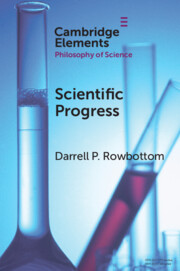Refine search
Actions for selected content:
3 results
8 - Paradigm Shifts and Group Belief Change
- from Part III - Incommensurability, Progress, and Revolutions
-
-
- Book:
- Kuhn's <i>The Structure of Scientific Revolutions</i> at 60
- Published online:
- 05 January 2024
- Print publication:
- 18 January 2024, pp 147-164
-
- Chapter
- Export citation

Scientific Progress
-
- Published online:
- 18 September 2023
- Print publication:
- 12 October 2023
-
- Element
- Export citation
Chapter 2 - Kuhn’s Kantian Dimensions
- from Part I - Foundational Issues
-
-
- Book:
- Interpreting Kuhn
- Published online:
- 25 June 2021
- Print publication:
- 08 July 2021, pp 27-44
-
- Chapter
- Export citation
